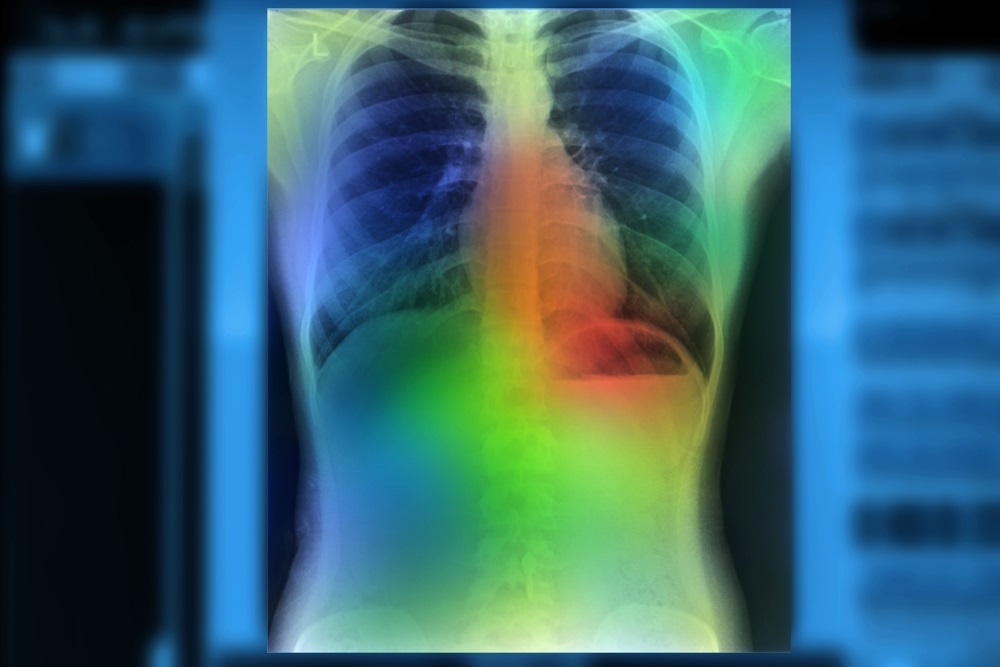Deep learning algorithms trained using artificial intelligence (AI) may help to determine how patients will respond to systemic treatments for non-small cell lung cancer (NSCLC), according to new research published in the journal Clinical Cancer Research.
 Image Credits: Zapp2Photo / Shutterstock.com
Image Credits: Zapp2Photo / Shutterstock.com
For the study, associate research scientist Laurent Dercle (Department of Radiology, Columbia University Irving Medical Center) and colleagues applied AI to standard-of-care (SoC) computed tomography (CT) scans of advanced NSCLC and trained deep learning algorithms to predict how sensitive tumors would be to three types of systemic treatments.
Deep learning is a type of machine learning where algorithms called artificial neural networks learn from large datasets and solve problems in a way that mimics how the human brain works and without requiring human supervision.
Current interpretation of CT scans is subjective
Dercle says that currently, the way radiologists interpret CT scans of patients with cancer who are receiving systemic therapy is essentially subjective.
The purpose of this study was to train cutting-edge AI technologies to predict patients' responses to treatment, allowing radiologists to deliver more accurate and reproducible predictions of treatment efficacy at an early stage of the disease,"
Laurent Dercle, Department of Radiology, Columbia University Irving Medical Center
Currently, to check how NSCLC patients’ respond to systemic therapies, radiologists assess differences in the size of existing tumors and in the appearance of new tumors that have formed.
However, determining patients’ responses in this way can be limited, says Dercle, particularly in cases where immunotherapy has been used because patients exhibit atypical responses and disease progression: "Newer systemic therapies prompt the need for alternative metrics for response assessment, which can shape therapeutic decision-making.”
What did the study involve?
For their study, Dercle and team used data available from phase II/phase III clinical trials looking at NSCLC patients who had been receiving one of three systemic therapies. The three therapies were an immunotherapy agent called nivolumab; a chemotherapy agent called docetaxel and a targeted agent called gefitinib.
They analyzed SoC CT images that had been performed for 92 participants in two trials of nivolumab, 50 participants in a trial of docetaxel and 46 participants in a trial of gefitinib.
To create their predictive model, Dercle and colleagues used scans that had been taken at baseline and during initial treatment assessment, which was three weeks later for the patients who had received gefitinib and eight weeks later for the patients who had received nivolumab or docetaxel.
Tumors were categorized as either sensitive or insensitive to treatment, according to the trails’ reference standards. For the nivolumab and docetaxel trials the reference standard was median progression-free survival and for the gefitinib trial it was post-treatment assessment of surgical samples.
For all three study populations, participants were randomly assigned to either a training or a validation group.
By applying machine learning to the CT images, the team built a multivariable model to predict the sensitivity of tumors among patients in the training group. The sensitivity predicted was scored from “zero,” which represented the most sensitivity… to “one,” which represented the most insensitivity. Tumor treatment sensitivity was defined based on differences observed in the largest lung tumor measured at baseline.
Identifying predictive features
Since the study population in the gefitinib trial was small, Dercle and colleagues developed and validated a model using radiologic features of tumors among 302 patients with metastatic colorectal cancer who had received anti-EGFR therapy. The features identified as predictive of treatment sensitivity among the colorectal cancer patients were then used to develop a model in the training group of NSCLC patients who had received gefitinib.
Across all study groups, eight radiologic tumor features were used to build prediction models for the three systemic therapies. Examples of the features were differences in the volume, margin and shape of tumors. The models for nivolumab and gefitinib each used four of the eight features and the model for docetaxel used one feature.
What did the study find?
Each model’s performance was assessed by calculating an accuracy measure called “area under the curve” (AUC), where a score of one represents perfect predictive accuracy. In the validation groups, the AUC scores for the models were 0.77 for nivolumab; 0.67 for docetaxel and 0.82 for gefitinib.
"We observed that similar radiomics features predicted three different drug responses in patients with NSCLC," says Dercle. "Further, we found that the same four features that identified EGFR treatment sensitivity for patients with metastatic colorectal cancer could be utilized to predict treatment sensitivity for patients with metastatic NSCLC."
The implications of the findings
Dercle adds that evaluation of radiomic signatures can potentially improve clinical decision-making saying that by using AI, "cancer imaging can move from an inherently subjective tool to a quantitative and objective asset for precision medicine approaches.”
The team acknowledges that the study population size was small, but Dercle says that “because AI can continuously learn from real-world data, using AI on larger patient datasets will help us to identify new patterns to build more accurate prediction models.”
Source:
AI may help predict responses to non-small cell lung cancer systemic therapies. EurekALert! 2020. Available at: https://www.eurekalert.org/pub_releases/2020-03/aafc-amh031820.php
Journal reference: